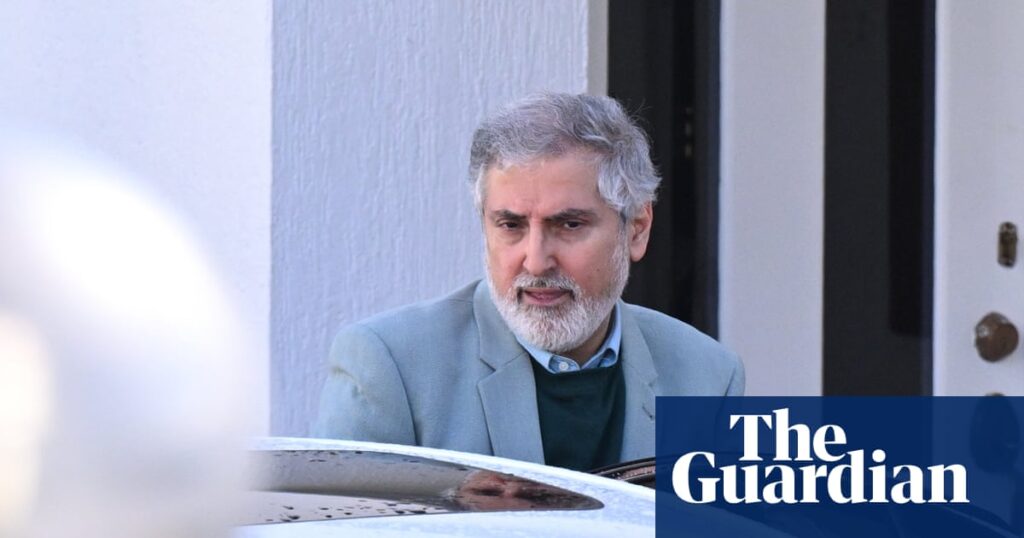The Australian government has rubbished denials from Iran over accusations its military wing had directed antisemitic attacks in Sydney and Melbourne, with the home affairs minister, Tony Burke, claiming evidence of direct links from Iran’s Islamic Revolutionary Guard Corps to the arson attacks.
It comes as Iran’s ambassador to Australia, Ahmad Sadeghi, was spotted leaving the Canberra embassy on Wednesday after becoming the first ambassador to be booted by the federal government since the second world war.
The Labor government has declined to say exactly what evidence led to intelligence agencies pointing the finger at the IRGC but the prime minister, Anthony Albanese, has hinted investigations included cryptocurrency and encrypted messaging.
Sign up: AU Breaking News email
“We have the information as to precisely which section this came from. It came from the IRGC … there is a very, very high level of confidence,” Burke told the ABC.
The Australian government alleged that 2024 arson attacks on the Adass Israel synagogue in Melbourne and Lewis’s Continental Kitchen in Sydney were engineered by commanders in the IRGC, who, through a series of intermediaries, targeted the premises in heavily Jewish neighbourhoods. Mike Burgess, the director general of the Australian Security Intelligence Organisation, alleged that some local people in Australia were paid to carry out the attacks without identifying individuals.
Iranian diplomats posted to Australia were not involved, Burgess said.
Albanese on Tuesday said the government had “credible intelligence” as to Tehran’s involvement and it was “likely” Iran was responsible for some other antisemitic attacks.
Iran’s government flatly rejected Australia’s claims on Wednesday. Its foreign affairs minister, Seyed Abbas Araghchi, said for Iran to attack Australia’s Jewish community “makes zero sense”, claiming Australia was seeking to “appease” Israel with the announcement. Foreign ministry spokesperson Esmaeil Baqaei promised a “reciprocal reaction” to the expulsion of Iranian diplomats from Canberra.
Australia’s government has remained tight-lipped on exactly how the security assessment was reached but on Wednesday gave a firmer outline of its confidence in Asio’s findings. The foreign affairs minister, Penny Wong, declined to say what information supported Asio’s assessment but in two media appearances on Wednesday Albanese appeared to indicate authorities had gathered electronic evidence that pointed directly to Iran.
“This is a rather extraordinary intelligence success by Asio and the Australian federal police in today’s world where things are often done on the dark web, where you have encrypted messages, cryptocurrency transfers,” he told ABC radio.
“It’s an extraordinary effort by Asio and the AFP to be able to trace the chain of command, if you like, right back to the IRGC.”
Speaking at a News Corp event in Wagga Wagga, Albanese again alleged: “These elements use the dark web, they use encrypted messages, they use cryptocurrency.”
He claimed investigators “were able to trace essentially the chain of command, if you like, right back to Iran”.
The prime minister said the intelligence gathering was “overwhelmingly … an Australian operation”, playing down speculation the Israeli intelligence agency Mossad played any role. The Jerusalem Post reported on Wednesday that Mossad might have acted “clandestinely and independently” or in partnership with Australian authorities, like when previous terror plots have been thwarted.
Albanese praised the work of Asio and said national security agencies would be given any new powers they asked for.
“I think that Australians can take confidence in our security agencies, know they have a government that backs our agencies and says, ‘whatever power you need, we will give you’.”
after newsletter promotion
Labor said last month it will make Asio’s powers for compulsory questioning permanent and expand offences covered by the rules, ignoring warnings from human rights advocates about the need for ongoing parliamentary scrutiny.
Sabotage, promotion of communal violence, attacks on the defence system and serious threats to Australia’s border security will be added to the rules for compulsory questioning under the changes.
Legislation to designate the IRGC as a terror group is likely to take some time, potentially weeks, to be finalised. Government sources said it would be a complex task to rewrite parts of the criminal code to be able to list an agency of a foreign government on that terror list.
The Coalition opposition has criticised the government for not listing the IRGC earlier. Some in the Coalition had been calling for such a move in 2023; the shadow treasurer, Ted O’Brien, claimed Labor had been “weak”, “slow” and “complacent” on the threat posed by Iran.
The shadow home affairs minister, Andrew Hastie, said while he had been “keen” to list the IRCG when he was chair of the intelligence committee before the 2022 election, there were mixed views within the Coalition government at the time.
“Anyone who sat on the national security committee of cabinet had an interest in what we did on the committee. It wasn’t listed but here we are, the world has changed,” he told ABC radio.
Burke, also on the ABC, defended the government’s response and claimed there was “not a minute between us receiving this assessment and us starting to work through what we do as a response”.
“There’s a huge amount of work and analytical rigour that goes into these Asio assessments. They’re not made lightly and they’re not made public unless they are very, very confident of the facts that we’re providing to the public,” he said.

